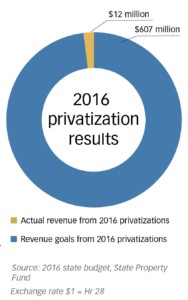Ukraine had high hopes in 2016 for selling off state industries, but the year turned out to be a disaster.
More than 1,800 of the nation’s state firms — long a source of corruption and a drain on the state budget — were supposed to have been whittled down through at least 300 sales of enterprises by 2017, projected to bring in $623 million in 2016 alone.
But the government fell short, earning only $12.1 million, according to the State Property Fund. The government sold two hydroelectric plants to a Ukrainian firm, as well as a bank to a Chinese buyer.
The government failed to sell the crown jewel of Ukraine’s privatization efforts – the Odesa Portside Plant – after putting it up for auction twice, only to have no bidders for the ammonia-producing plant.
Francis Malige, managing director for Eastern Europe and the Caucasus at the European Bank for Reconstruction and Development, called the Odessa plant sale a “dark spot.”
“Again in December, against the advice of the (international financial institutions) community, the government went ahead full speed, directly towards the wall, and hit the wall,” Malige said. “Twice in one year.”
Need for ‘re-launch’
The government is seeking to sell off its stakes in some 300 enterprises by 2018, including six power distributors and a power generator, which the State Property Fund featured amid its top 10 companies for privatization.
Malige said the government needs to move away from energy and look to privatize other industries, such as agriculture, first.
“The whole privatization program needs a re-launch,” he said. “You want a demonstrational effect of successful privatizations in Ukraine and, maybe, you don’t start with companies in over-regulated industries,” the EBRD director added. “You save them for later because they are the most difficult to privatize.”
Plans to sell government stakes in energy enterprises have been in the works for around a decade.
The State Property Fund announced plans to sell not only Odesa Portside Plant last year but six regional power supply companies, or oblenergos, and four combined heat-and-power plants on its privatization calendar.
Later the State Property Fund pushed back the auction date of five of the oblenergos to January, and one to May, although it appears plans to sell five of the power distributors will again be postponed.
Centrenergo, a company that owns three power plants in different regions of Ukraine, has also had its privatization pushed to 2017.
Concorde Capital head of research Alexander Paraschiy said while the privatization of the energy sector as a whole doesn’t need to be postponed, the State Property Fund should wait until parliament adopts the awaited legislative changes for the sector before selling off stakes in certain enterprises.
The electricity market law was due to be adopted in the fall of 2016, but so far parliament has only approved its first reading.
“Until that law on electricity market is approved, we should not start privatization, at least privatization of Centrenergo,” he said.
The legislation will bring Ukraine in line with European standards and laws in the electricity sector and enable it to become compliant with European Union’s Third Energy Package.
“We also know that our power sector regulator is planning to introduce the asset-based tariff methodology for (power) distribution companies and before that is approved, it is not a good time to sell these companies,” Paraschiy said. “These new rules (will) significantly change the value of these companies. It will increase (their) value.”
Paraschiy believes while the government could easily sell the six oblenergos, they have no intention to sell Centrenergo.
“They had a lot of opportunities to sell it last year,” he said.
Pavlo Rizanenko, a Petro Poroshenko Bloc deputy who is vice chairman of the Verkhovna Rada’s privatization committee, said that Ukraine essentially “didn’t have privatization in 2016.”
Rizanenko added that the energy privatization process was largely “remains of the energy sector” from what has yet to be sold off.
“The decision has been made, thermal generation should go private, so we have to complete this sale,” Rizanenko added. “And these are comparatively big chunks in terms of potential earnings for the state.”
Rizanenko blamed some of the slowness in privatization on many state-owned firms carrying the label of “strategic enterprise” under Ukrainian law, meaning that parliament has to pass special legislation to sell them.
“That has been an issue since EuroMaidan,” Rizanenko said. “There are vested interests behind every enterprise.”

Ukraine set high goals for privatization in 2016 and came nowhere close to meeting them.
